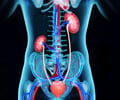
‘Melatonin reduces kidney failure by reducing oxidative stress, which causes cell death and a build-up of toxins that damage the kidneys when patients use vancomycin.’
Read More..Tweet it Now
Globally, antibiotic use is one of the leading causes of drug-induced kidney failure, with more than 13.3 million cases reported each year. Read More..
Kidney failure is also associated with an increased risk of death in hospitalized patients. Almost 25 percent of these patients die in hospitals when toxins build up as they also receive antibiotic treatments for various infections.
“We’ve known from previous studies the ability of vancomycin to induce kidney injury through oxidative stress and mitochondrial damage, and we also knew how melatonin could restore renal mitochondrial function, so making these findings in this small group of patients was promising and could lead to bigger therapeutic breakthroughs,” said the study’s lead author, Luigi Brunetti, an associate professor at the Rutgers Ernest Mario School of Pharmacy.
Researchers said one of the reasons they believe melatonin reduces kidney failure is its ability to alleviate oxidative stress, which causes cell death and a build-up of toxins that damage the kidneys when patients use vancomycin.
They postulate that melatonin, a natural supplement commonly used as a sleep aid, restores and repairs this kidney function facilitating the clearance of toxins from the body.
Advertisement
The study was the first to examine such human data, and researchers plan further clinical studies on a larger and broader population.
Advertisement
Source-Eurekalert












